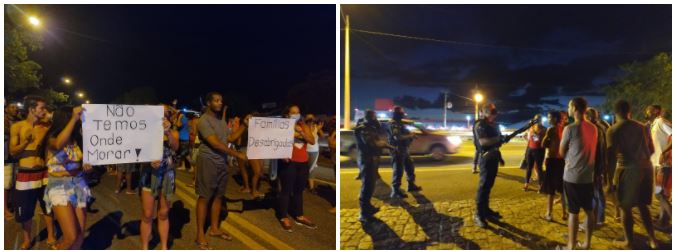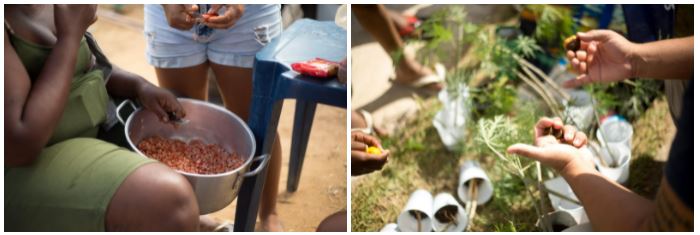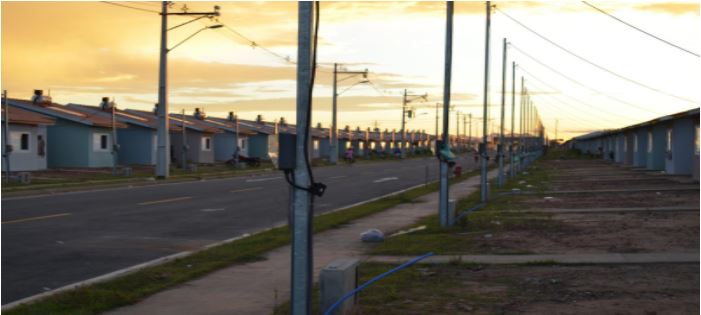Within the coronavirus pandemic and a progressive reduction in social investments at the municipal, state and national levels, hundreds of families begin the largest urban occupation reported in the recent history of the municipality of Campos dos Goytacazes, the largest municipality of the State of Rio of January in territorial extension. According to data collected by the Secretariat for Human and Social Development, in Campos, about 130 thousand people, corresponding to more than 25% of Campos population live with up to R $ 89.00 per month, that is, in state of extreme poverty¹. Naturally, the issue of housing has gained a new centrality, since many families, in the pandemic context, had to choose between eating and paying rent. According to an article published by the “Terceira Via” Journal, the construction of the popular houses was completed, without fulfilling a social function, since, at least, 2016.²
By Juliana Rocha Tavares*
The occupation at “Novo Horizonte” (in English, New Horizon) Housing Complexes started on the night of April 13th, with a majority group of women, who reported having conflicts with the Military Police during the process. In an interview, an occupier said that she stayed three days without eating because she was afraid of “losing” the occupied house.
The occupation joins diverse groups, as families who were contemplated by the Federal Habitacion Program called “Minha Casa, Minha Vida”, waiting for the keys delivery; families who were enrolled in the Habitacion Program, but were not drawn (even meeting all the criteria), families who were or would be evicted for default on rent, families that were living in favor in small and inadequate rooms in the relatives’ house, families that lived in houses with structural problems or located in risk areas, among others. What unites all these groups? The situation of extreme vulnerability and the struggle for the constitutional right to housing. Most families only remain in the occupation for more than 30 days, without access to water and electricity, because they simply have nowhere else to return.
The occupants organized a first protest movement April 14th on BR 101 Road, to draw the attention of the media and the government to the housing agenda. On April 15th, the Federal Police notified families of a judicial repossession order, scheduled to take place on April 21th. The families then organized new protest movements on April 16th and April 20th.

Protest Movement organized on BR 101 Road on April 20th by the families, who are occupying the “Novo Horizonte” Housing Complex. Photos: Daniela Abreu and Juliana Rocha.
On April 16th, occupation leaders contacted journalist Daniela Abreu, who initiated a dialogue with various social movements, who decided to support the “Novo Horizonte” occupation. The movements redacted a manifest against eviction at “Novo Horizonte” occupation, which was signed by more than 30 entities. On April 17th, the group “Emancipa Campos” donated 30 basic food baskets to occupying families in greatest social vulnerability. In record time, the popular lawyer Rafaelly Galossi called the Federal Public Defender, which managed to suspend the repossession. From April 21th, several social movements began to directly support the occupation, through the construction of the community kitchen, food collection, cultural activities and legal support for the occupation.

Community kitchen and gardening activity in the occupation. Photos: Girassol Fotografia.
On April 24th, the company “Realiza” (responsible for the construction of the houses) and the Federal Bank “Caixa Econômica Federal” filed a new legal appeal and the families were notified that the repossession would take place within 5 days, with the possibility of using violence and the support of the National Force. Then, the social movements that supported the occupation started to map the occupying families, in order to understand the social and intersectional profile of such families. Such mapping supported the new appeal by the Federal Public Defender, which guaranteed, from May 5th, another 30 days before repossession. The mapping was performed through interviews with 303 occupying families (almost 50% of the total families), confirming the thesis that these families were in extreme social vulnerability.
From the analysis of the partial data, we could observe that almost 20% of the families declared to have no defined income, 33% were in a state of extreme poverty (income per capita less than R$ 89.00) and 24% were in state of poverty (income per capita between R $ 89.00 and 178.00). Less than 1% of families reported having a per capita income greater than R $ 1000.00. Within an intersectional view, more than 80% of the occupants declared themselves to be black or brown and 66% of the heads of families are women, with 47% of the total being single mothers. Many of these women worked as manicurists and day cleaners and lost their main source of income with the pandemic.
Almost 80% of respondents said that they already felt hungry and all declare that the situation worsened after the start of the pandemic. Almost 60% of occupants claimed to have incomplete Elementary Education and none of them have completed Higher Education. Regarding the occupation of the interviewees, almost 80% claim to be informal or self-employed workers and only 2.6% claim to work with a formal contract. According to the analysis of the sociologist and professor at the State University of the Universidade Estadual do Norte Fluminense Darcy Ribeiro (UENF) and Luciane Soares: “Analyzing the responses of the interviewees about occupation, a profile with low specialization is observed, linked to the informal market, therefore, without a social security protection network and without any access to the rights guaranteed minimally by law.”
About 55% of respondents stated that they did not own a home and were not included in any housing program. Another alarming fact is that about 34% of the interviewees stated that they did not have any type of social benefit.
Civil society counselors from the Municipal Council for Social Assistance (CMAS) requested a meeting to discuss the situation of families in the “Novo Horizonte” occupation. The Council meeting took place on May 10, with the participation of leaders of the occupation and representatives of social movements that work in support of the occupation. The Council drew up an important note, in which, the civil society and government counselors recognize the legitimacy of the occupation in the Housing Complexes “Novo Horizonte I, II and III”. A Commission was also created to monitor the mapping of families present in the occupation and to negotiate with the City Hall the offer of Social Assistance and housing programs for such families. This committee is comprised of counselors Bruna Machel, from the Associação Resista Campos and Graciete Santana, from the Sindicato Estadual dos Profissionais da Educação (SEPE), Luiz Paulo Gama, a leadership of the occupation and also representatives of the municipal government. The mapping started on April 18, with the presence of a large team of Social Assistants from the municipality.
In a country where there are so many houses without people and so many people without houses, in which the constitutional right to housing is neglected by the government in all spheres, urban occupations are legitimate and extremely necessary resources in the struggle for housing. We hope that the families that now occupy “Novo Horizonte” and so many other families in social vulnerability continue to dream and fight for new horizons, in which social justice, the rights to housing, food, health and quality education are guaranteed for everyone.
We ask the readers to collaborate with the community kitchen of the occupation families, through donations to the pix of Emancipa Campos (emancipa.campos@gmail.com) and of PCB, UJC and Unidade Classista (22 999376057).
* Juliana Rocha Tavares is a physics teacher at the Instituto Federal de Educação Ciência e Tecnologia Fluminense (IFFluminense) and PhD in Natural Sciences by the Universidade Estadual do Norte Fluminense Darcy Ribeiro (UENF).
References:
¹ https://g1.globo.com/rj/norte-fluminense/noticia/2021/04/24/quase-130-mil-pessoas-vivem-em-extrema-pobreza-em-campos-segundo-levantamento-da-prefeitura.ghtml. Acesso: 11/05/2021
² https://www.jornalterceiravia.com.br/2021/04/14/manifestantes-cobram-entrega-de-772-casas-populares-prontas-pelo-menos-desde-2016/. Acesso: 13/05/2021.










